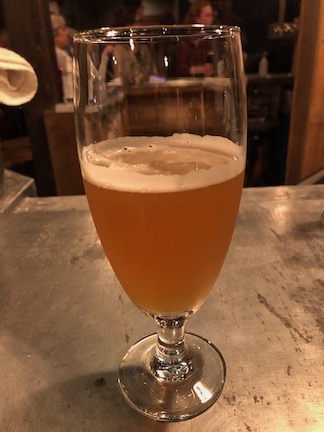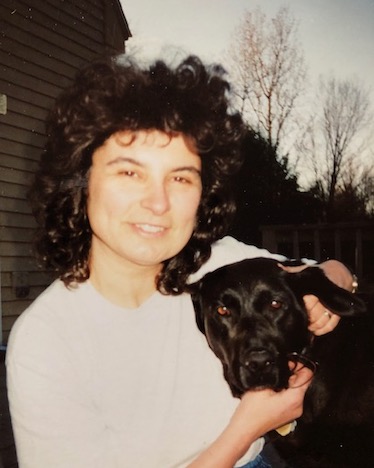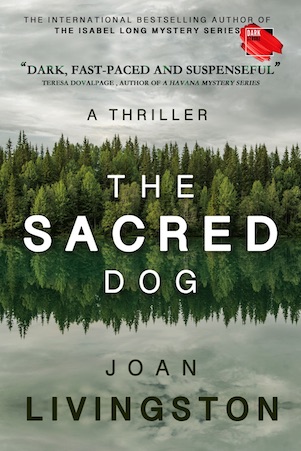Although those who know me might feel differently, nobody in my next novel, The Sacred Dog is based on a real person. The one exception is the dog, Louise, who belongs to Frank Hooker, a main character in the book. At some point Frank decided to rename his bar The Sacred Dog in honor of her. Louise also has a pivotal role later in the book.
The real inspiration for Louise is a dog named Sheena. We didn’t call her that but she knew the name, so we were stuck. Hank and I were living with our parcel of six kids in a small town in the sticks of Western Massachusetts when she found us.
Her owners, who lived down the road, left her tied up when they moved to the other side of town until she broke loose and found our compost heap. Her owner said we would keep her after I called. When the man came to drop off her bowl and chain, the dog lay on the deck and didn’t even acknowledge his presence. Sheena knew better.
Sheena, who was a black Labrador retriever, came with habits. She liked to wander the neighborhood, which was heavily wooded, visiting every dog and home. She knew where there were handouts from the neighbors. She was the alpha dog and all the dogs bowed to her as if she was indeed a queen. She enjoyed rolling in cow manure at a farm up the road. She enjoyed manure, period. Sheena also was pregnant, we found out later, and after the litter was born, we had her spayed.
Sheena took to our family and sat regally amidst the hubbub of six kids playing inside. That’s when I dubbed her “the sacred dog” since she would put up with any amount of noise and activity.
At the time I worked as a reporter at home for a local newspaper. When I wrote at my desk, Sheena slept beneath my legs. As soon as I turned off the computer, she got up and found something else to do. Her job was done.
When Sheena died, I grieved longer for her than I did relatives I loved. And then she became a character in the book I began before the turn of the new century. (More on that another time.) Now, I am glad the book is being published thanks to darkstroke books.
By the way, The Sacred Dog is a tale about a feud between two men — Frank Hooker and Al Kitchen. And I can honestly say nothing good is going to come from this feud.
Here’s a scene from The Sacred Dog involving Louise. Frank is at a river with Crystal, his 9-year-old daughter who has just returned to town with her mother, and his dog.
“Is it true your bar used to be named for Mommy, but you began calling it after your pet dog because you were mad we moved to Florida?” She looked directly at him. “Am I right, Daddy?”
Frank sat upright. “Well, honey, that isn’t the real story. I’d never do somethin’ like that,” he lied. “The new name just seemed like a fine idea at the time. The Sacred Dog. It has a certain ring to it. Don’t you think?”
His daughter’s head shook energetically. “Oh, yeah,” she said.
“Besides, Louise is an awfully good dog.”
Crystal knew Louise’s story. Frank wrote her after he found the dog hanging around his trashcans one afternoon when he took a break from writing up the monthly liquor order. He called Monk Stevens, in his capacity as Holden’s dog officer, and he told Frank she was probably dumped there because she was bone-skinny and had no collar. “She’s yours if you want her,” he told Frank. “You know what’ll happen if you don’t.”
Frank decided on the spot to save her. It’d been a while since he had a dog, and he took to calling the dog Louise after a girl he once knew who bore the same mournful expression. He fed her as much food as she wanted and within a few weeks, she became eternally grateful. One slow night, when Frank and Early played cribbage, Louise nudged the topside of her head beneath Frank’s hand. After a while, he told her to “git,” and though the dog was clearly disappointed, she left him alone while he played and talked with Early.
“You know Early. That dog is a saint, a pure saint. She never complains, even when those kids come in Sunday night to bother her. Look at ’er. The way she sets there, you’d think she was somethin’ sacred.” He paused while he studied the fan of cards in his hand. “Yeah, that’s what she is. Louise is the sacred dog.”
“Oh shit, Frank. You’ve gone off your rocker. Dogs aren’t sacred. They shit where you go. They eat shit and roll in shit.”
“Louise is different, I tell you.”
“Why don’t you shut the heck up and get me another beer?”
What had been a pet owner’s moment of tenderness now became an inspiration for Frank. A few weeks later, he decided to officially change the name of his bar, which was still Ronnie’s, to The Sacred Dog. Truthfully, he was thinking about getting a new name after it dawned on him it was rather foolish to have a bar named for his ex-wife. He discounted using his own or anything with the word Holden in it. The town had enough buildings named after John Holden, the town’s founder. Early suggested the Bowtie, but Frank said no one ever wore one in his bar and he expected no one ever would.
“A John Deere cap or torn T-shirt would be more like it,” Frank said, and Early laughed as if he had a tickle in his throat.
The Sacred Dog suited Frank fine, so he asked a lawyer in town to draw up the papers to make it legal. Then he asked Early to make the sign. The regulars thought Frank was joking, but when he told them the story, they agreed it was a good name for a bar. Some stiffs in the back room of the general store did grumble to Frank about it. The pastor of the Holden Congregational Church called to complain, but Frank, who had only been to church as an adult for funerals and his own wedding, told the men he didn’t see the connection.
LINK: The Sacred Dog is available for Kindle readers to pre-order. I am grateful if you do as it helps with ratings. The official release is Dec. 27 and paperback will follow. Here’s the link: https://mybook.to/thesacreddog
ABOUT THE PHOTO ABOVE: That’s Sheena and me, when I had dark hair.




